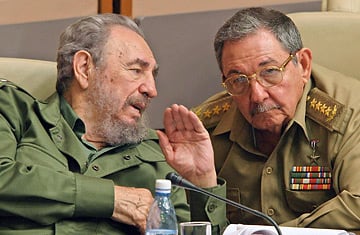For months, Raúl Castro has denounced the inefficiency of the Cuban government and pledged to streamline and improve its functioning.
He began preparing himself to fulfill this promise today with a grand (and in some ways, surprising) restructuring of his cabinet. The shakeup does not introduce all new or necessarily progressive individuals to these high ranks, but surrounds Raúl with more of his own military men and fewer of Fidel’s cronies. In fact, two of the most well-known and visible members of the Fidelista cabinet—Secretary of the Council of Ministers Carlos Lage and Foreign Minister Felipe Perez Roque—were both replaced, and as the Miami Herald reported this evening, the younger Castro’s decision “leaves the cabinet leadership entirely in the hands of members of the armed forces and people in his closest confidence.”
There are several theories already circulating about the news.
One, presented by Sandy Acosta Cox of Echo Cuba, emphasizes the important differences between the Castro brothers and their followings. She says that the cabinet changes are to position “key Raulistas in place, especially before the major announcement everyone is anticipating—Fidel’s death.” Some analysts consider Fidelistas and Raulistas to be at odds on issues like economic opening and increased freedoms for Cuban citizens, the Raulistas having passed what reforms they could last year before Fidelistas put their foot down. To avoid a struggle for power or opposition to new policies when Fidel dies, Raúl is clearing some obstacles from his path in advance.
Meanwhile, and along similar lines, Cuban exile leaders in Miami fear that Raúl is consolidating power in a dangerous fashion. Not only is he centralizing power in himself and his followers, but he is placing additional control of the government in the hands of the military. The Cuban American National Foundation calls the move reminiscent of Stalin.

More optimistically: it could be that Raúl is, indeed, streamlining the Cuban bureaucracy. Perez Roque, though highly visible in the past 10 years as Foreign Minister, was ultimately “freed” of his position today because he had been appointed not for his expertise but for his closeness to Fidel. In fact, he was Fidel Castro’s personal assistant before he became Foreign Minister. Bruno Rodriguez, the replacement appointed by Raúl, is a career diplomat who once served as ambassador to the United Nations. Furthermore, he is relatively unknown—a good indication that Raúl is working to put the best people forward instead of those closest to him.
The real test of Raúl’s intentions will be what policies proceed from the shakeup, and when.